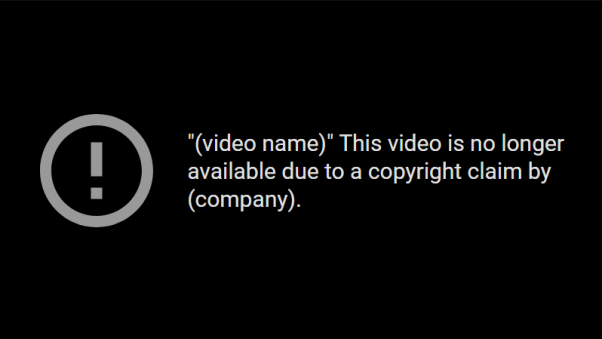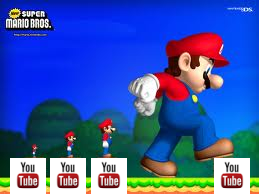Blog Archives
YouTube, Nintendo, and Copyright

On April 15th, Ethan Gach published an article in which he discusses how Nintendo flagged several videos from YouTuber Modern Vintage Gamer [1]. The article discusses the homebrew scene, the reason for Nintendo’s takedown of the videos (Modern Vintage Gamer was showing a Switch homebrew software in the works and showed some gameplay of Nintendo games), and Nintendo’s history of aggressively pursuing YouTubers who show their games. Quoting Modern Vintage Gamer, Cach writes:
“They’re all Switch homebrew videos and claims reasons are for things like Mario Kart, Splatoon 2, which by the way I don’t have any Splatoon 2 footage in any of my videos, and Link to the Past,” he said in the video. According to Giannakis, the claims against his videos were because of screenshots or footage of games being played on an emulator that appeared in them. Giannakis argues that his videos fall under fair use and shouldn’t be subject to the copyrighted materials claims, adding that the game’s he’s running on the Switch are all ROMs he owns original copies of and aren’t pirated.
This, I think, raises an important question regarding YouTube’s practices for Content ID and copyright takedowns. We are all familiar with how YouTube works: they favor the big corporation or the larger YouTuber, and when these two things are at odds they try to negotiate. We are all also familiar, I hope, with how current digital copyright law works in regards to fair use. What I would like to do, then, is ramble a bit about this case, what should have happened, and what is the best (hypothetical) way to move forward.
On Nintendo v. Let’s Plays
 It seems that – perhaps out of anger due to low Wii U sales – Nintendo is taking its vengance out on gamers by filing copyright complaints against Youtube “Let’s Play” videos, walkthroughs, and any video that has Nintendo-owned content. It’s important to point out that, unlike Sega did a few years ago, Nintendo is NOT taking down videos or channels. Instead, it’s using content ID matching systems to place ads on videos using footage from Nintendo games and redirecting revenue from the major “Let’s Play-ers”. Greg Lastowka has a great explanation of the legal reasoning based on copyright, trademark, and IP policy over at Gamasutra that you should go read if you haven’t already, so I won’t use the same approach. What I would like to do instead is look at some of the claims being made regarding this “scandal” and explain their validity, then state my position on whether Nintendo should or should not do what they are doing.
It seems that – perhaps out of anger due to low Wii U sales – Nintendo is taking its vengance out on gamers by filing copyright complaints against Youtube “Let’s Play” videos, walkthroughs, and any video that has Nintendo-owned content. It’s important to point out that, unlike Sega did a few years ago, Nintendo is NOT taking down videos or channels. Instead, it’s using content ID matching systems to place ads on videos using footage from Nintendo games and redirecting revenue from the major “Let’s Play-ers”. Greg Lastowka has a great explanation of the legal reasoning based on copyright, trademark, and IP policy over at Gamasutra that you should go read if you haven’t already, so I won’t use the same approach. What I would like to do instead is look at some of the claims being made regarding this “scandal” and explain their validity, then state my position on whether Nintendo should or should not do what they are doing.
Over at Screw Attack, Ghost King replies to the claims that “Nintendo is stealing from Let’s Players”, “Nintendo is trying to screw over their customers”, “Nintendo is Dooming Let’s Plays”, and “Nintendo is screwing over their PR with this.” I mostly agree with his comments. Indeed, the “free promo” and “it’s killing their PR” arguments are ridiculous, and – as Lastowka explained – Nintendo is within their legal right when they file these claims. What I don’t agree with is that this is an overblown issue.










































Videogame Copyright – Some Key Terms
May 7
Posted by Quijano
The current state of copyright law for videogames, specially the question of who “owns” a videogame, is an interesting one. There are currently game designers making the argument that Longplay videos on Youtube infringe on their copyright[1], with a handful of studios even arguing that any use of their game’s visuals or audio files – even for the purposes of fair use – breaches copyright law [2]. There are videogame companies that will sue fans for holding unofficial events [3] and others that encourage fans to create videogames using their intellectual property [4], while others still will publish fan-made games [5]. With several legal precedents and philosophies on intellectual property on games ranging from open culture platforms to live services model, there is one question that has yet to be definitively answered: whose’ game is it anyway? That is the question that will be explored in this piece. Before answering the question, however, it might be prudent to define a few key terms and discuss the current state of videogame law. This post will introduce these key terms and discuss how they apply to videogames.
Read the rest of this entry →
Posted in Video Game Commentary
Leave a comment
Tags: Copyright, IP law, videogame copyright